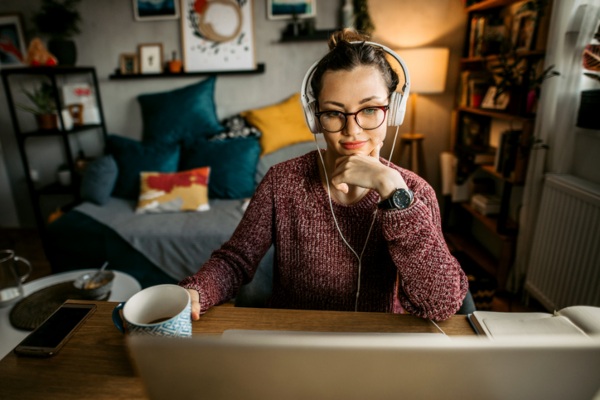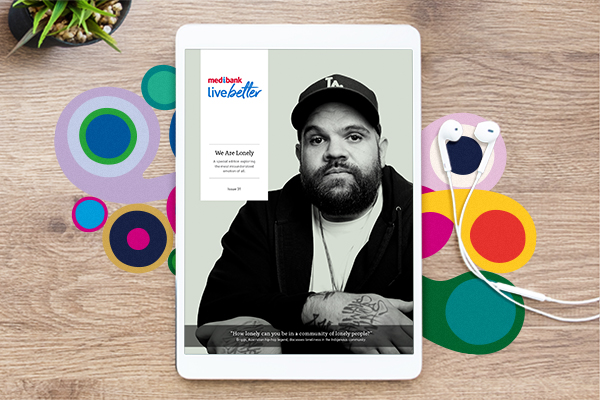-
Eat, sleep, zoom, repeat. For so many Australians working or learning from home has become the norm, which means hours spent in video meetings or lessons.
For me, it came as a rude shock after returning to remote working from parental leave early in 2021. Not only was I grappling with the etiquette and technology (you’re on mute, Soph) there was something very unsettling about looking at my own face all day.
It wasn’t long before I purchased a web cam thinking, ‘this laptop web cam just will not do’. And soon after that my husband (who is conveniently a video director) was working on my lighting.
It felt a bit vein and silly at first. But it did prompt me to think, how strange it is to see your own face while in a meeting. And what effect does that have on your confidence and body image, especially in an environment where a lot of us are feeling flat and worn out from a pandemic?
I began to notice friends and family remarking on their appearance during our video calls too. A joke about a double chin, or remark on their wrinkles.
So when I started digging into the topic, I wasn’t surprised to discover I wasn’t alone with feeling a bit ‘ugggh’ when switching on the camera. New research exploring the effect of video calling found that one in three Australian adults identified new appearance concerns when on video calls or meetings.1
Danni Rowlands, National Manager of Prevention Services at the Butterfly Foundation, likened video calling to sitting in front of a mirror for an extended period of time.
“This behaviour at the best of times can increase body and appearance checking, critiquing or criticising. Typically we would discourage prolonged time spent in front of a mirror, in an effort to support a more positive body image.”
Not only that, video calling allows us to instantly compare how we look in comparison to our peers.
“At the best of times this is problematic,” says Danni. “The more often a person makes body or appearance comparisons, the more at risk they are of feeling unhappy, uncomfortable and dissatisfied with their body and how they look.”
For many working or learning remotely for the first time due to COVID restrictions last year, it was coupled with changes to food and exercise habits, and a lack of social connection.
Sarah Kewming, Clinical Lead for Medibank’s Mental Health Phone Support Line said since the beginning of the pandemic, body dissatisfaction has been a regular theme with callers of all ages.
“What we are seeing is people who may not have an established eating disorder, but there are emerging thoughts and behaviours that are unusual or unhealthy for them.
“For example, with exercise. It’s completely healthy to go out for a walk or exercise each day. We know that exercise releases endorphins and boosts mood. But if you miss a day and that starts to create feelings of anxiety, or you feel angry at yourself, that’s when you know something is tipping into a problem.
“If you notice over a period of time those kinds of things are causing you distress, or you feel panicked or uncomfortable, it’s worthwhile reaching out for professional support.”
Like many others, working remotely and video calls are likely to continue to be part of my life well beyond the pandemic. So it’s all about adjusting to that, and keeping it healthy: less video, more good old fashioned phone calls and definitely no more self-deprecating comments about my wrinkles.
Tips for remaining body confident on video calls
There are many positive things that people can do to ensure their self-esteem and body confidence stays in check whilst engaging in video calls, says Danni from the Butterfly Foundation:
- Limit your time on video calls: It’s ok to say no to a video call. If you are in a meeting, turn your video off if you’re not presenting or talking. Try making a phone call rather than a video call if you need a break from the screen.
- Focus on other things: Try to focus on who is talking, rather than being distracted with your own image. It is strange seeing yourself on video.
- Dress for your day: Even if working from home, get dressed and present yourself neatly, as you would if you had to venture out of the house to go to school or work. You don’t need to look perfect, but ensuring that you are presenting yourself in a way that makes you feel comfortable is a sign of self-respect, this is good for your self-esteem and your body confidence.
- Be the positive change with your friends: If you find friends are chatting a lot about their appearance you can always let them know that it’s who they are rather than how they look that is important, throw in some positive comments and re-direct the conversation. If it’s happening a lot it may be a sign that your friend is struggling. Reach out to them privately if you feel they need some support.
If you are feeling down or feeling really uncomfortable about how you look, it may be time to reach out for support. You can start with your GP, or by calling the Butterfly Foundation’s national helpline on 1800 334 673. If you’re a Medibank health insurance member, you can also chat to a mental health professional at no extra cost* with 24/7 Medibank Mental Health Support. Log in or call 1800 644 325 any time of the day or night.
Are video calls impacting our self esteem?


Explore new perspectives with Live Better magazine.
Around a third of Australians experience problematic levels of loneliness, but the emotion is still so misunderstood. Find out what loneliness really looks like, and explore unique ways to connect in this special edition of Live Better magazine.
Things you should know:
* Some referred services may involve out-of-pocket costs.
References:
1. Pikoos T et al., 2021, The Zoom Effect: Exploring the Impact of Video Calling on Appearance Dissatisfaction and Interest in Aesthetic Treatment During the COVID-19 Pandemic, Aesthetic Surgery Journal